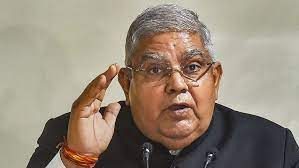The Rajya Sabha chairman recommends legislation to a standing committee on IPC, CrPC, and the Evidence Act and requests a report within three months
The three proposed legislation that would replace the IPC, CrPC, and the Evidence Act have been sent to the Standing Committee on Home Affairs for review. Jagdeep Dhankhar, the chairman of the Rajya Sabha, has requested that the committee provide its findings within three months.
Home Minister Amit Shah presented the proposals in the Lok Sabha on August 11. They are known as the Bharatiya Nyaya Sanhita, Bharatiya Nagarik Suraksha Sanhita, and the Bharatiya Sakshya Bill.
Once approved, the measures would, respectively, replace the Indian Evidence Act, the Code of Criminal Procedure, and the Indian Penal Code.
The criminal justice system in India would be transformed as a result of the measures, according to Shah, who also stated that the modifications were made to provide prompt justice and build a legal system that meets peoples’ modern demands and expectations.
The Bharatiya Nyaya Sanhita, 2023, the Bharatiya Nagarik Suraksha Sanhita, 2023, and the Bharatiya Sakshya Bill, 2023, as introduced in the Lok Sabha and pending therein, have been referred to the Department-related Parliamentary Standing Committee on Home Affairs for examination and report within the next three months, the Rajya Sabha Secretariat stated in a late Friday bulletin.
Members of both Houses of Parliament make up the Rajya Sabha’s Parliamentary Standing Committee on Home Affairs.
The head of the Standing Committee on Home Affairs is BJP member Brij Lal.
The Bharatiya Nyaya Sanhita proposes various modifications to the current laws, including those relating to defamation, suicide attempts, and the expansion of the definition of the crime against women committed during sexual contact when “deceitful means” are used.
In the latest incarnation of the sedition statute, it also contains additional offenses including acts of secession, armed rebellion, subversive operations, separatist activities, or harming the sovereignty or unity.
The BNS contains a definition of the term “terrorism” for the first time; the IPC did not.







